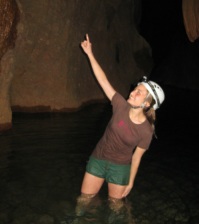|
7/24/2012 5 Comments Using Unusual Animals to Study Human Disease: A Summer Research Project in Veternarian Medicine - Week 2Week 2: A Day in the Life...by Natalie Punt Research is Dynamic When I was a kid, I guess I was what you’d call a “dork.” I read books three grades above my expected level, made honor roll every year, and won many awards in reading and math. Not much has changed since then—except that I’ve realized a “dork” is really someone who pursues their intellectual passions. Pursuing my intellectual passions is exactly why I chose a career path in veterinarian research. Another positive aspect of this career path is that it gives me the opportunity to be surrounded by other “dorks.” Being on campus in the summer doing research, I am surrounded by like-minded people pursuing their interests and passions. During the summer, we can celebrate our unique attributes by parading openly through the library and lingering near the offices of distinguished professors in hopes of enticing them into conversation. Because of the nature of my research, I don’t have a standard daily routine. Every day has been different, yet the days have one thing in common: continual progress made towards an end goal. I can honestly say there hasn’t been a dull moment, although of course there are periods of hard or monotonous work in addition to exciting moments. One of the most exciting days was when we tested our approach to identifying proteins that were significantly different in the Naked Mole Rat. Before the test, we occasionally wondered if our approach was crazy, so when we validated our work, it was a huge relief as well as a scientific victory. One of my favorite aspects of my summer research project is the freedom to guide my project in the direction that interests me. Before I go into the lab in the morning, I read up on the latest advances and cancer and genomic research, which gives me ideas to contemplate throughout the day and inspiration for new directions to take with my project. For example, I am creating a color-coded cluster analysis map to show cancer protein orthologs that differ significantly between species. My interpretation of the cluster analysis has been greatly aided by methods used in the recent sequencing of human microbiome as well as the comparative analysis of multiple breast cancer subtypes. Another positive aspect of research is learning new subjects, or applying subjects you’ve studied before in a new way. As an undergrad, my statistics class put me to sleep, so I was dreading having to use statistics for my summer research, and thought it would suck the fun right out of the project. However, I was astonished at how satisfying it was to use statistics to analyze population distributions, verify that the populations were different from each other and find confidence intervals! My summer research project exposes me to subjects that I would otherwise skim over or actively avoid. It also motivates and inspires me to read the latest research articles and become well-versed in genomics and oncology. Research demands drive, passion, and intellectual curiosity—in other words, it’s the perfect career for a “dork” like me! About the Blogger
5 Comments
9/19/2012 07:46:48 pm
All the efforts you put in the blog post is appreciable. Entire blog is informative. Looking forward to read more blogs and contents from you. Wish you luck!
Reply
10/9/2012 08:17:37 pm
People’s life time seems to be really interesting issue and very oft people can select one thing one at time, then you have not a long
Reply
10/14/2012 03:21:47 am
Thank you for such a fantastic blog on Using Unusual Animals to Study Human Disease: A Summer Research Project in Veternarian Medicine - Week 2. Where else could anyone get that kind of info written in such a perfect way? I have a presentation that I am presently working on, and I have been on the look out for such information.
Reply
10/24/2012 06:03:02 pm
Only some diseases such as influenza are contagious and commonly believed to be infectious. The micro organisms that cause these diseases are known as pathogens and include varieties of bacteria, viruses, protozoa and fungi. Thanks.
Reply
10/28/2012 08:16:21 pm
Systematic activities to prevent or cure health problems and promote good health in humans are undertaken by health care providers. Applications with regard to animal health are covered by the veterinary sciences. Thanks.
Reply
Your comment will be posted after it is approved.
Leave a Reply. |
The Lab JournalWelcome to the summer internship series of 2012! Follow 9 Scientista bloggers through their summer internships to catch a glimpse of what it is like to be a scientista^TM. By Title- India Presents: A "New World Symphony"
- Through The Lens: The Intricacies Of Diabetes - Do Nanoparticles Glow? - Using Unusual Animals to Study Human Disease - Using the Hubble Telescope - You Think What You Eat - Experimenting With the Life of a Scientist(a) - 18.085: My Summer at MIT - Science Heals: A Summer of Global Health Research By BloggerRabeea Ahmed
Riana Balahadia Shaira Bhanji Nzuekoh Nchinda Amy Beth Prager Natalie Punt Juliet Snyder Pin-Wen Wang Stephanie Wang Archives |
The Network for Pre-Professional Women in Science and Engineering
The Scientista Foundation is a registered 501(c)(3) -- Donate!


 RSS Feed
RSS Feed